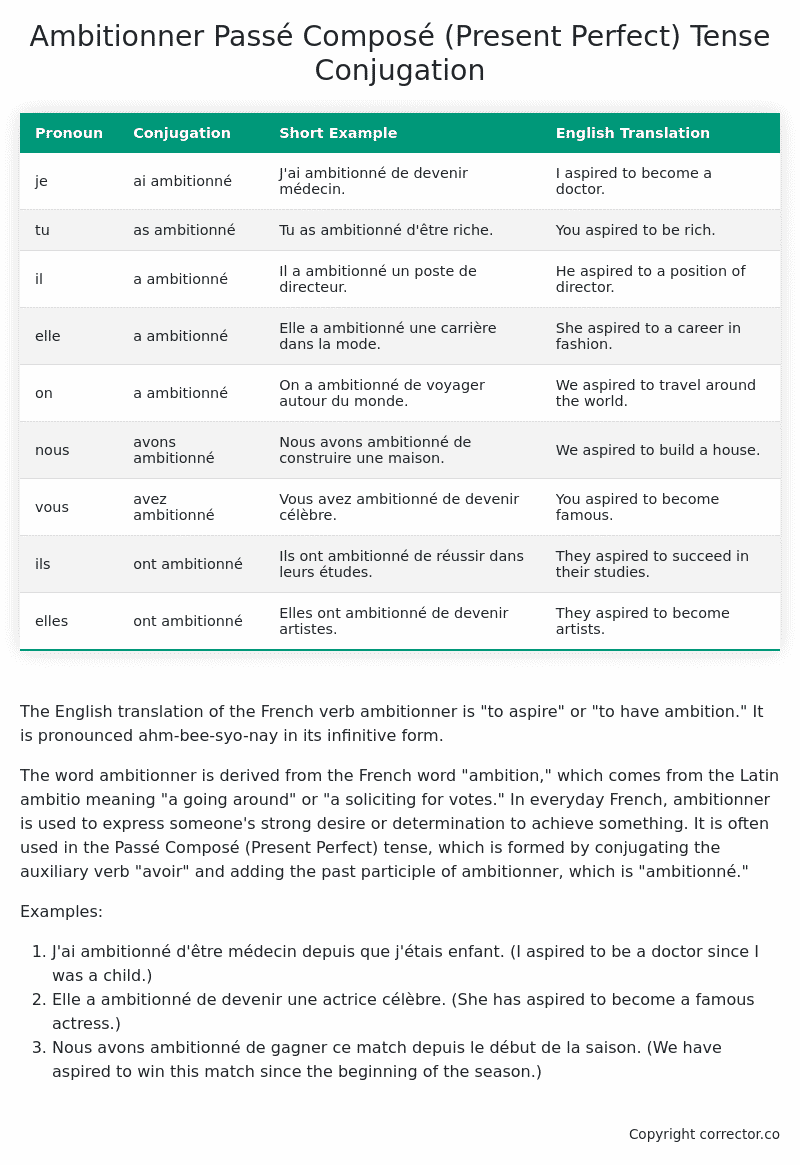Passé Composé (Present Perfect) Tense Conjugation of the French Verb ambitionner
Introduction to the verb ambitionner
The English translation of the French verb ambitionner is “to aspire” or “to have ambition.” It is pronounced ahm-bee-syo-nay in its infinitive form.
The word ambitionner is derived from the French word “ambition,” which comes from the Latin ambitio meaning “a going around” or “a soliciting for votes.” In everyday French, ambitionner is used to express someone’s strong desire or determination to achieve something. It is often used in the Passé Composé (Present Perfect) tense, which is formed by conjugating the auxiliary verb “avoir” and adding the past participle of ambitionner, which is “ambitionné.”
Examples:
- J’ai ambitionné d’être médecin depuis que j’étais enfant. (I aspired to be a doctor since I was a child.)
- Elle a ambitionné de devenir une actrice célèbre. (She has aspired to become a famous actress.)
- Nous avons ambitionné de gagner ce match depuis le début de la saison. (We have aspired to win this match since the beginning of the season.)
Table of the Passé Composé (Present Perfect) Tense Conjugation of ambitionner
| Pronoun | Conjugation | Short Example | English Translation |
|---|---|---|---|
| je | ai ambitionné | J’ai ambitionné de devenir médecin. | I aspired to become a doctor. |
| tu | as ambitionné | Tu as ambitionné d’être riche. | You aspired to be rich. |
| il | a ambitionné | Il a ambitionné un poste de directeur. | He aspired to a position of director. |
| elle | a ambitionné | Elle a ambitionné une carrière dans la mode. | She aspired to a career in fashion. |
| on | a ambitionné | On a ambitionné de voyager autour du monde. | We aspired to travel around the world. |
| nous | avons ambitionné | Nous avons ambitionné de construire une maison. | We aspired to build a house. |
| vous | avez ambitionné | Vous avez ambitionné de devenir célèbre. | You aspired to become famous. |
| ils | ont ambitionné | Ils ont ambitionné de réussir dans leurs études. | They aspired to succeed in their studies. |
| elles | ont ambitionné | Elles ont ambitionné de devenir artistes. | They aspired to become artists. |
Other Conjugations for Ambitionner.
Le Present (Present Tense) Conjugation of the French Verb ambitionner
Imparfait (Imperfect) Tense Conjugation of the French Verb ambitionner
Passé Simple (Simple Past) Tense Conjugation of the French Verb ambitionner
Passé Composé (Present Perfect) Tense Conjugation of the French Verb ambitionner (this article)
Futur Simple (Simple Future) Tense Conjugation of the French Verb ambitionner
Futur Proche (Near Future) Tense Conjugation of the French Verb ambitionner
Plus-que-parfait (Pluperfect) Tense Conjugation of the French Verb ambitionner
Passé Antérieur (Past Anterior) Tense Conjugation of the French Verb ambitionner
Futur Antérieur (Future Anterior) Tense Conjugation of the French Verb ambitionner
Subjonctif Présent (Subjunctive Present) Tense Conjugation of the French Verb ambitionner
Subjonctif Passé (Subjunctive Past) Tense Conjugation of the French Verb ambitionner
Subjonctif Imparfait (Subjunctive Imperfect) Tense Conjugation of the French Verb ambitionner
Conditionnel Présent (Conditional Present) Tense Conjugation of the French Verb ambitionner
Conditionnel Passé (Conditional Past) Tense Conjugation of the French Verb ambitionner
L’impératif Présent (Imperative Present) Tense Conjugation of the French Verb ambitionner
L’infinitif Présent (Infinitive Present) Tense Conjugation of the French Verb ambitionner
Struggling with French verbs or the language in general? Why not use our free French Grammar Checker – no registration required!
Get a FREE Download Study Sheet of this Conjugation 🔥
Simply right click the image below, click “save image” and get your free reference for the ambitionner present perfect tense conjugation!

Ambitionner – About the French Passé Composé (Present Perfect) Tense
Formation of the Passé Composé
Set the auxiliary verb with either
Conjugate the auxiliary verb
Add the past participle
Common everyday usage patterns
Narrating Past Events
Sequential Actions
Describing Completed Actions
Interactions with other tenses
Imperfect Tense
Conditional and Future Tenses
Summary
I hope you enjoyed this article on the verb ambitionner. Still in a learning mood? Check out another TOTALLY random French verb conjugation!


